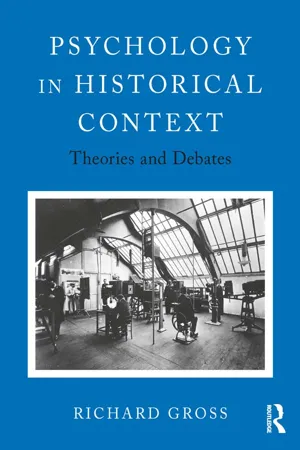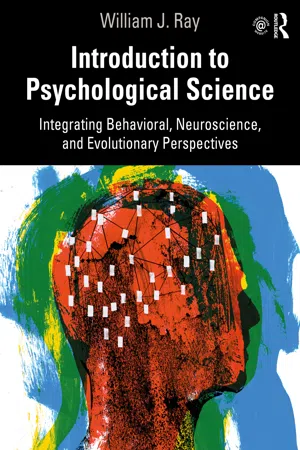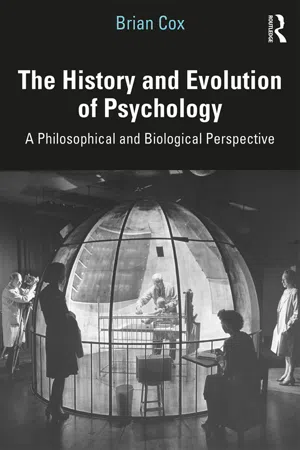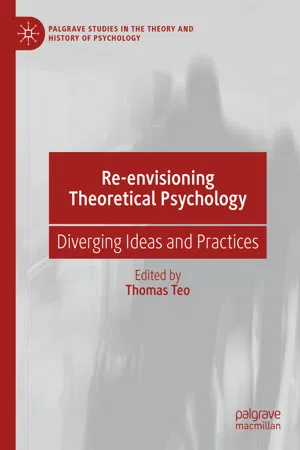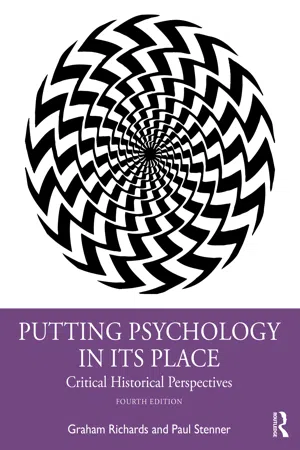Psychology
Origin of Psychology
The origin of psychology can be traced back to ancient civilizations such as Egypt, Greece, and China, where early thinkers explored the nature of the mind and behavior. In the 19th century, psychology emerged as a distinct scientific discipline with the establishment of the first psychological laboratory by Wilhelm Wundt in Germany. This marked the beginning of modern psychology as a field of study.
Written by Perlego with AI-assistance
Related key terms
12 Key excerpts on "Origin of Psychology"
- eBook - ePub
Psychology in Historical Context
Theories and Debates
- Richard Gross(Author)
- 2017(Publication Date)
- Routledge(Publisher)
Chapter 1 Historical perspectives Psychology as the study of … what?If there’s a logical place to start one’s study of Psychology, it’s by looking at how it came to be where it is now; in other words, its history. But as we shall see below, this isn’t as straightforward as it may sound: there are different ways of ‘doing history’ and different resultant histories. Put another way, there’s more than one history of Psychology.Some may disagree with the premise that we should start with Psychology’s past, claiming instead that the logical starting point is to decide what Psychology is about, its subject-matter. But again, this too is a matter of debate and disagreement. In terms of one of its histories, Psychology’s subject matter (its ontology) is defined differently by different schools of thought or theoretical approaches, which have developed over time (roughly, the past 140 years, albeit with considerable overlap between them). Part of this debate relates to similarities and differences between human beings and non-human animals; sometimes this is addressed directly, sometimes it’s ignored altogether.These approaches (such as Structuralism, Behaviourism, and Cognitive Psychology) differ not only in terms of what they consider the appropriate subject-matter to be, but also in terms of the methods used (or advocated) for studying this subject-matter. This relates to the debate regarding the nature of science (in general) and the validity and appropriateness of using certain methods to investigate human beings/people (in particular).The implication of the preceding paragraphs is that, regardless of how we view Psychology’s history, and regardless of how its subject-matter is defined, Psychology adopts a scientific approach. This, in turn, begs two major questions: (1) What do we mean by science? And (2) what kind of science is/should Psychology be? These questions relate to epistemology and methodology - eBook - ePub
Early Childhood Studies
A Social Science Perspective
- Ewan Ingleby(Author)
- 2012(Publication Date)
- Bloomsbury Academic(Publisher)
The word psychology is derived from two Greek words ‘psyche’, meaning mind and ‘logos’, meaning study so a literal translation of the discipline is ‘the study of the mind’. This means that psychology literally translates as the study of the mind. Malim and Birch (1998, p. 3) claim that the academic study of psychology began in 1879 when Wilhelm Wundt opened the first psychology laboratory at the University of Leipzig in Germany. Wundt focused upon ‘introspection’, meaning observing and analysing the structure of conscious mental processes. It was the emphasis placed upon measurement and control of thinking processes that marked the separation of psychology from its parent discipline philosophy.The rise of behaviourismMalim and Birch (1998, p. 8) argue that by 1920 the usefulness of this method was questioned. John B. Watson was one of a number of theorists who believed that it was wrong to focus upon introspection because this approach to studying psychology is immeasurable and so it invalidated its scientific credentials. Consequently Watson dedicated himself to the study of what has become known as ‘behaviourism’, or human behaviour that is measurable and observable. Behaviourism remained the dominant force in psychology over the next 30 years, especially in the United States. The emphasis was placed upon identifying the external factors that produce changes in behaviour, learning or conditioning using a stimuli response model.Competing perspectivesAs with many philosophical and sociological perspectives, psychology is characterized by competing paradigms or models of thought, with theorists becoming grouped together according to which perspective they adopt. Malim and Birch (1998, p. 9) argue that an interesting reaction to behaviourism came in the form of the Gestalt school of psychology emerging in Austria and Germany in the 1920s popularized by psychologists such as Wolfgang Kohler (1927). This branch of psychology takes a holistic approach considering that the person is in totality greater and more complex than his or her individual characteristics. This in turn complicates a focus upon the external factors producing thoughts and behaviour. - eBook - ePub
Psychology for Actors
Theories and Practices for the Acting Process
- Kevin Page(Author)
- 2018(Publication Date)
- Routledge(Publisher)
CHAPTER 1 A Very Brief History of Psychology in the WestPsychology, as an interest in understanding and describing the internal human experience, has been around for as long as recorded human history, maybe longer when you consider ancient shamanic practices and religious rituals dating back more than 50,000 years. However, as a discipline in modern Western culture, psychology really began in the mid-nineteenth century and has been on an exponential growth path ever since.My first map of psychology, then, will be at the “world atlas” scale, looking down, as it were, from 50,000 feet upon the entire history of the field in the broadest of strokes to give us a context for some of the finer-grained maps and models we will explore later. This general history lesson will be of interest to some students and not to others. If you are purely concerned with applications of psychology to the actor’s craft, feel free to skip ahead and come back here when you become more intrigued with how this whole thing came about. However, for the rest, this is where our story begins.The Antecedents of Psychology: Buddha and the Greeks to Descartes and the Scientific MethodIn sixth-century India, an enlightened sage called the Buddha evolved the idea from his personal ruminations during meditation practice that sensations and perceptions together become ideas in a human’s consciousness. The Buddha’s ideas about human consciousness and psychology would not become widely available in Western culture until the 1950s and 1960s when translations of Eastern esoteric texts finally arrived in America (Page, 2007). Similarly, around the same time in China, the philosopher Confucius pondered the notions of thought and learning in the human experience. But the real questioning and conversation about the nature and meaning of human consciousness, particularly in what would become Western psychology, began in the fifth and fourth centuries BCE - eBook - ePub
Taking It Big
C. Wright Mills and the Making of Political Intellectuals
- Stanley Aronowitz(Author)
- 2012(Publication Date)
- Columbia University Press(Publisher)
5 On Social Psychology and Its Historical Contexts The Origin of Psychology as an Independent DisciplineThe disciplines of social science made a relatively late entrance in Western thought. For centuries after Galileo and Copernicus forged the contours of modern physical sciences, social relations were considered beyond the scope of the sciences. Consequently, as late as the nineteenth century they were taken as objects of political and moral philosophy; natural science tried to reduce society and social relations to the categories of physics and biology, a tendency that has, in recent years, been revived by the reductionist wing of the discipline of neuropsychology, whose advocates believe that we can discover the sources of virtually all emotional and mental phenomena in the brain. The situation was so dire for the development of the autonomous social sciences that Émile Durkheim, one of the founders of modern sociology, insisted, at the turn of the twentieth century, that society be considered a “social fact,” a declaration that signified its refusal to be reduced to natural science. Similarly, although from different premises, Wilhelm Dilthey made the argument that the methods of the natural sciences were inapplicable to the human sciences because, in contrast to the objects of the physical world, humans interact with one another on the basis of subjectivity. On the other hand, whereas Max Weber held that the object of sociological investigation was to achieve “understanding”—a formulation that followed the neo-Kantian view that the nature of human interactions precluded scientific reduction—Durkheim followed natural scientific thinking in his determination to discover “laws” of human relations that were specific to its own level of reality.1Until the later decades of the nineteenth century, only political economy, psychology, and ethnology (later termed “anthropology”) enjoyed a degree of recognition in academic institutions. What studies that are now called sociology and political science were subsumed under the terms “social and political philosophy.” Political economy’s birth as a legitimate intellectual discourse coincided with the rise of industrial capitalism, but its origins went back to Aristotle’s Politics - eBook - ePub
- Andrew Colman(Author)
- 2016(Publication Date)
- Routledge(Publisher)
The date chosen by most historians for the birth of experimental psychology is 1879, the year in which Wilhelm Wundt (1832–1920) opened his laboratory in Leipzig. United States patriots sometimes make halfhearted attempts to dispute this, claiming that the first American psychologist, William James (1842–1910), opened a laboratory at Harvard University four years earlier. But the truth is that James was never very interested in experimental methods, and Wundt clearly has priority as the founder of experimental psychology because he alone was trying deliberately to create a new discipline. Within a decade experimental psychology was flourishing in several parts of Germany. Myths abound about the birth pangs of psychology, and it is worth pausing to consider exactly what happened, and what did not happen, in Germany in the 1880s. Attempts to understand mental experience and behaviour were nothing new. As we have seen, important contributions were made long before the time of Plato and Aristotle. Nor was the word psychology an invention of the nineteenth century. The Latin word psychologia emerged from obscure origins in Germany in the sixteenth century, but no one is certain who coined it or exactly when it was first used. The English word psychology first appeared in 1693 in Steven Blankaart’s The Physical Dictionary: Wherein the terms of Anatomy, the names and causes of Diseases, chyrugical Instruments and their Use; are accurately Describ’d. Blankaart refers to “Anthropologia, the Description of Man, or the Doctrin concerning him [which is divided] into Two Parts; viz. Anatomy, which treats of the Body, and Psychology, which treats of the Soul”. The word psychology was used sporadically throughout the eighteenth and early nineteenth centuries, but it was not until the 1830s that it began to be used frequently and came to be widely understood - eBook - ePub
Neural Geographies
Feminism and the Microstructure of Cognition
- Elizabeth A. Wilson(Author)
- 2016(Publication Date)
- Routledge(Publisher)
These traditional narratives of the birth of scientific psychology suggest that psychology has been grafted from the interplay of science (physiology) and interpretation (mental philosophy). This constitutive moment is considered to be a historical event, now past. However, if this interplay is considered instead to be the ongoing condition of psychology's coherence, then it becomes clear why the unequivocal realization of a scientific psychology has remained elusive in this century irrespective of its institutional and geographical location. In the first instance, I derive my account of this interplay from Boring's (1957) classic history of experimental psychology. While psychology is now diverse enough to accommodate many other histories, it is this account of the union of nineteenth-century physiology and philosophy that has come to be the history of scientific psychology in general. More specifically, it is to this history that contemporary cognitive psychology is indebted. Boring marks the emergence of an identifiable (experimental) psychology thus: “In this history of experimental psychology, we must, therefore, go back into philosophical psychology in order to see what it was that, married to physiology, gave birth to physiological, experimental psychology” (Boring 1957, 158). This marriage of a scientific methodology to the problems of mental philosophy was not an equitable or symmetrical union. Rather, it was more the overcoming of philosophy than an active engagement with it that motivated the emergence of scientific psychology (Canguilhem 1980) - eBook - ePub
Introduction to Psychological Science
Integrating Behavioral, Neuroscience and Evolutionary Perspectives
- William J. Ray(Author)
- 2021(Publication Date)
- Routledge(Publisher)
In the 1600s, science as a way of understanding the world began to emerge. Galileo and Isaac Newton proposed methods for performing scientific inquiry that have directed the physical sciences for the past 300 years. In the 1800s, Charles Darwin’s ideas focused on the evolution of the species including both plants and animals. Two men are credited with establishing the first psychological laboratories in the world: Wilhelm Wundt in Germany and William James in the United States at Harvard University. Wundt’s work was known as structuralism. William James was particularly interested in the functional aspects of psychological processes, asking the question what purposes specific psychological processes serve. This came to be known as functionalism. Learning Objective 3: Summarize the major approaches to psychology in the 20th century. Psychology was influenced by the early philosophies, but became an influential science during the 20th century. Several schools of thought emerged including behaviorism, Gestalt, psychodynamic, humanistic, and cognitive behavioral. Structuralism suggests that a process can be understood as an addition of its parts. Gestalt psychology suggests that the whole is always greater than the sum of its parts. One important area of Gestalt research was perception. Three important developers of this approach were Max Wertheimer (1880–1943), Kurt Koffka (1886–1941), and Wolfgang Köhler (1887–1967). Behaviorism adopted a strict form of empiricism, the idea that knowledge should be derived through our sensory processes, and that all that should be studied is observable behavior. Behaviorism also carried with it a philosophical position that all behavior is learned. Thus, learning became an important focus of behaviorism. Important researchers in behaviorism include Ivan Pavlov (1849–1936), Edward Thorndike (1874–1949), John Watson (1878–1958), and B. F. Skinner (1904–1990) - eBook - ePub
The History and Evolution of Psychology
A Philosophical and Biological Perspective
- Brian D. Cox(Author)
- 2019(Publication Date)
- Routledge(Publisher)
I might as well be explicit at this point. I believe that psychology was made possible by two revolutions. First, the philosophical scientific revolution, in which such philosophers as Descartes and Locke made it possible for us to examine the world and ourselves through observation, reflection and logical argument, instead of the appeals to authority that characterized thought in the Middle Ages. Second, perhaps the most momentous revolution in science occurred in the mid-19th century, first with the materialist emphasis on physiochemical explanations for mind and body and then the Darwinian revolution that followed immediately. All of the subsequent changes in psychology, from psychoanalysis to behaviorism, followed from these revolutions.This is not to say that by these revolutions psychology acquired a stable paradigm immediately or easily. In fact, for much of its history, psychology did not have “universally recognized scientific achievements that for a time provide model problems and solutions for a community of practitioners.” Instead, psychology was characterized as what Kuhn calls a preparadigmatic science.In this phase of historical development, the scientific community is fractured. They argue not about results, but about philosophy. During the period of time covered by this book, psychologists argued about what psychology should be about, what methods should be used and what should count as acceptable data. In the preparadigmatic period of a science, books are written that are long on philosophical speculation and short on results. They are trying to state their position and win converts to it. Compare, for example, these two statements, the first by the great 19th-century psychologist and philosopher William James (see Chapter 7 ) and the second by the behaviorist John B. Watson (see Chapter 8 ):Psychology is the Science of Mental Life, both of its phenomena and of their conditions. The phenomena are such things as we call feelings, desires, cognitions, reasonings, decisions and the like and superficially considered, their variety and complexity is such as to leave a chaotic impression on the observer.( James, 1890/1983, p. 1)Psychology as the behaviorist views it is a purely objective experimental branch of natural science. Its theoretical goal is the prediction and control of behavior. Introspection forms no essential part of its methods, nor is the scientific value of its data dependent upon the readiness with which they lend themselves to interpretation in terms of consciousness.(Watson, 1913, p. 158) - eBook - ePub
- Guido Villa(Author)
- 2014(Publication Date)
- Routledge(Publisher)
The Psychology of Peoples, which constitutes a very important. part of general Psychology, has a twofold origin: idealistic and Psychology positive. The former is connected with the philosophy of Hegel and with the development of juridical and historical studies in Germany; the latter derives its source, on the contrary, from Comte, and is a result of biological ideas applied to social questions.The last-named form of the Psychology of Peoples finds its principal representative in Herbert Spencer, who in his Social Statics (1850) had compared social evolution to organic evolution, and in his Principles of Psychology , published some years later, had maintained the impossibility of explaining the phenomena of consciousness by means of individual analysis alone.3Lubbock.—Waitz.—Bastian.—Müller.This branch of science received important contributions from the anthropological studies of Lubbock and Tylor on the origin of civilisation and primeval man,4 through which much light is thrown on the psychological conditions of primitive humanity. The researches on primitive civilisation found their complement in a comparison with the intellectual and moral condition of savages in the present time. Something in this line was done by Lubbock, in his work on Prehistoric Times; but the first to attempt a complete study of the life of savage peoples, based on copious ethnographical data, was Theodor Waitz. This German scientist, following the lead of Herbart, aimed at giving a scientific basis to Psychology, which he considered a fundamental part of philosophy, in opposition to Fichte, Hegel, and Schelling, who had assigned to it a purely secondary importance. Apart from various other works on general Psychology, his most important work deals with the Anthropology of Peoples in a State of Nature , which he did not live to finish.1 Another well-known writer on ethnographical and sociological subjects is Adolph Bastian;2 and, of course, Herbert Spencer’s sociological studies afford a notable contribution to ethnographical Psychology.3 Comparative mythology and the study of languages have also had their part in the general result, especially through the works of Max Müller, whose vast range of culture embraces both English and German science.4 - eBook - ePub
Re-envisioning Theoretical Psychology
Diverging Ideas and Practices
- Thomas Teo, Thomas Teo, Thomas Teo(Authors)
- 2019(Publication Date)
- Palgrave Macmillan(Publisher)
11Context 2 : In the first half of the twentieth century, the alliance of some psychologists with logical positivism led to the idea of a theoretical psychology closely related to the logical analysis of psychological language (Bergmann, 1953 ; Koch, 1951 ). For example, doing theoretical psychology at the height of neobehaviorism, Bergman accepted that “the logic of science is one thing; its history and the psychology of the scientist is another thing” (Bergmann, 1953 , p. 456). The same pattern can be found in the early Sigmund Koch, while still under the spell of logical positivism . Settling the agenda for the future of theoretical psychology, he defended that “the central problem of the fundamental psychologist is not what doctrine to embrace or concoct, but simply to assay, realistically, how psychology can be made to move towards adequate theory ” (Koch, 1951 , p. 298, italics in original). At this time, Koch still believed in the possibility of a general theory for psychology, which he later came to reject.Context 3 : The establishment of Division 24 in 1962 inaugurated a new conception of TPP. Now, philosophical questions about psychology originated from a new source: the approximation of psychology to phenomenology, existentialism and the humanistic movement in general, which culminated with the Rice symposium in 1963 (Williams, 1999 ). Simultaneously, philosophy of science was undergoing a dramatic change, as historically-oriented proposals began to emerge (e.g., Hanson, 1958 ; Kuhn, 1970 ; Polanyi, 1958 ; Toulmin, 1961 ). In this context, it suffices to remember the role Michael Polanyi’s book played in the development of Sigmund Koch’s later conception of theoretical psychology, as the latter himself acknowledges in his autobiography (Koch, 1999 - eBook - ePub
Putting Psychology in its Place
Critical Historical Perspectives
- Graham Richards, Paul Stenner(Authors)
- 2022(Publication Date)
- Routledge(Publisher)
One frequent line in the orthodox 20th-century History of Psychology textbook genre was that the questions have remained the same but the methods of answering them change. This is, with qualifications, unsatisfactory, for had these earlier thinkers been asking the same questions Psychologists ask, then devising at least some of the obvious empirical methods for answering them would have been easy. Even in 1700, they could have run rats through mazes, circulated questionnaires, see how many trials it took to learn word lists, or invented (albeit crude) instruments to measure reaction times – all methods typical of modern Psychology. The reason they did not (excepting a few anticipations of the questionnaire) was that they were not asking these questions in the first place. Psychologists’ precursors were not usually doing what aspiring scientific Psychologists began doing in the late 19th century and continued to do throughout the last century. They were often not failing to answer the same questions but asking different ones about the nature of Virtue; the relations between the immortal soul (if it existed) and the body; whether all our ideas came from sensory experience or whether some were innate and self-evident; what kind of a substance – if any – the mind was; how to master one's ‘passions’; how to educate children; or, at a cruder level, how the character was manifested in the face (though Sheldon's ‘somatotype’ based personality theory surely has echoes of this). In addressing these, they often engaged in what looks like Psychological theorising, being led to discuss topics such as perception, the structure of the mind, even, not infrequently, child and animal behaviour. Such discussions set the terms in which Psychologists began tackling the same topics, which is where the historical link lies. The crucial discontinuities really lie in the facts that (a) these matters mostly arose in the context of issues no longer figuring, at least in the same way, on Psychology's agenda, and (b) nobody saw such investigations as contributions to a single discipline, Psychology.Many, if not all, modern Psychological enquiries are, in some way, anticipated in earlier works, but the connections between them frequently remain unresearched and obscure. Historians have variously cast them as part of Psychology's ‘continuous’ history, even if they had little or no impact on the later work and were unknown until modern historical disinterment (‘anticipation spotting’), or excluded them from it because they did not meet their criteria for ‘scientific Psychology’. The interesting questions such anticipations raise are really, in the first case, why they did not have an impact, and in the latter case, what their role in Psychology's history has actually been. But answering these would take the traditional historian in awkward directions: either highlighting unwelcome discontinuities in the first case or hitherto censored continuities in the latter. The two major topics on which a convincing case can be made for a continuous lineage of proto-scientific enquiry and theorising since 1600 – indeed since antiquity – are memory and visual perception, with emotion coming close though actually quite problematic (see Chap. 11 ). Hatfield (2002) - eBook - ePub
- Elliot Hearst, Eliot Hearst(Authors)
- 2019(Publication Date)
- Routledge(Publisher)
Now, there were objections to the experimentalist approach to psychology. The new psychology was criticized as trivializing the human mind and its abilities; or, as reducing it to a mere reflection of the brain’s activities; or, as depersonalizing the human being. Similar criticisms are heard today and they were probably as unfair then as they are now. After all, what could an experimental psychology have been like at that time? Could it have studied the self, innateness, abilities? Could it have experimented on the will, imagination, or anything other than what it did? Could the explanations that emerged be more visionary than the experiments that were then possible? Such questions are not rhetorical; they deserve answers. I conclude this chapter by suggesting why psychology, as it became a science, initially followed such a narrow path.The list of significant persons in the history of psychology in Germany prior to its maturity—a list that includes many people already mentioned in this chapter—seems to divide in two and thereby suggests the answer to our questions. One part of the list contains the names of persons who earned the Ph.D. in philosophy or law, and the other part of the list contains the names of people earning the M. D. degree. The Ph.D. list consists of the following: Kant, Fichte, Hegel, Schelling, Schopenhauer, von Hartmann, Fries, Herbart, and Beneke; the last three have been listed together, out of chronological sequence with the others, for obvious reasons. The list of M. D. degree holders is longer so we will include only those who are most directly concerned with the point we are making: Johannes Müller, E. H. Weber, Fechner, Helmholtz, Donders, Wundt, Hering, and C. Ludwig.The psychology that emerged in Germany was mainly an extension of the psychology that the medical-physiological group fostered (see also Thompson & Robinson, Chapter 10 , this volume). Trained in chemistry, physics, mathematics, and physiology, this group was the heir to an experimentalism that had grown gradually over several hundred years. The ideas they started with came from many sources; sometimes they believed things that were not the case; some were Kantians (Müller); some were mystics (Fechner) or vitalists (Weber); and they probably all had substantial religious convictions. But whatever their philosophical preferences, they all had the readiness to do something concrete about whatever they thought was, or might be, the case. For instance, Müller believed that the speed of the neural impulse was faster than the speed of light—that is, it was instantaneous—and so not measurable physiologically. Using a nerve-muscle preparation in frogs, Helmholtz devised a simple way to study the question and demonstrated that the neural impulse was actually a relatively slow phenomenon. Given this knowledge, it was then possible to connect it to Bessel’s personal equation and, later, reaction time data in a concrete and ultimately explanatory way—or at least Helmholtz and Donders believed that was so. We know that they were too optimistic and that even after more than 100 years there is still argument about their hypothesis; that, however, is just another way of saying that it is still a live topic (see Posner & Shulman, Chapter 9
Index pages curate the most relevant extracts from our library of academic textbooks. They’ve been created using an in-house natural language model (NLM), each adding context and meaning to key research topics.
